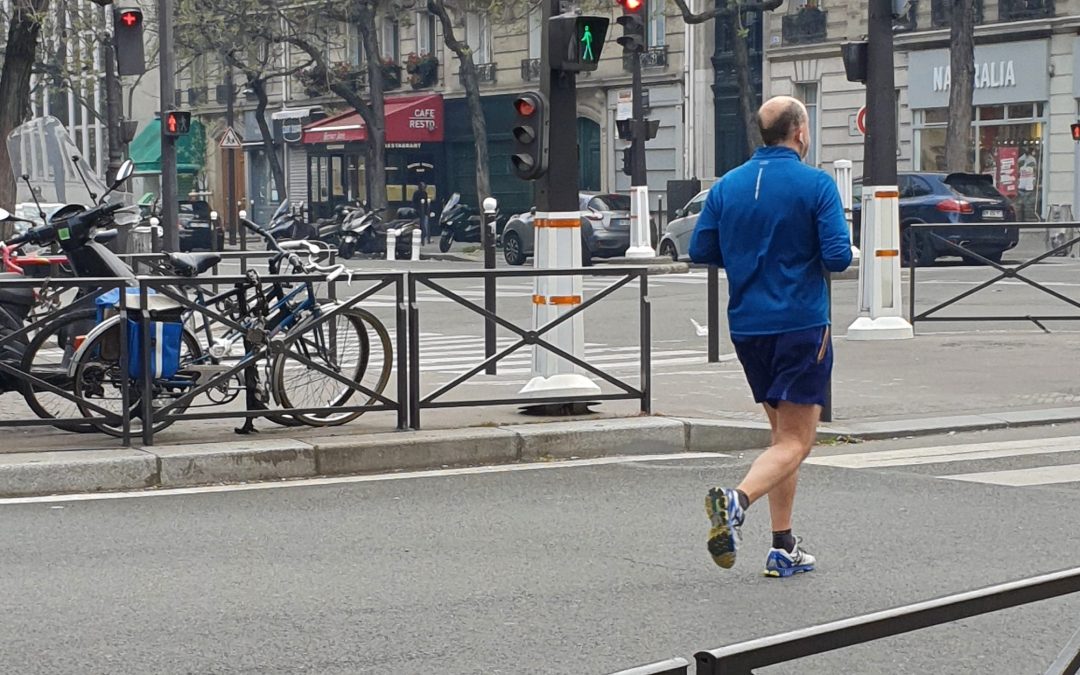By Anne Swardson
“They said we were an undisciplined country. But look how we respect these rules, these requirements, that are the most rigorous ever imposed on our people in peacetime.”
So spoke President Emmanuel Macron last night as he announced an extension of France’s 29-day coronavirus lockdown until May 11 – and that on condition that the rules are obeyed. Those include staying at home except for very specific purposes: necessary shopping, medical visits, limited exercise and essential work.
“May 11 will only be possible if we continue to be good, responsible citizens, to follow the rules, and if the propagation of the virus continues to slow,” he said. Indeed, some progress has been made on flattening the French curve.
But note the word “rules.” The entire French lockdown is predicated on rules, and they are enforced by police officers who stop you and fine you if they think you are breaking them with an unauthorized sortie. Or if you don’t have the right voucher self-allowing your excursion.
The voucher is even an app now, that you can download from the Interior Ministry web site. Handily, or not depending on your point of view, it generates the time. That lets the cops tell if your grocery trip has lasted four hours or if you have exceeded the one-hour limit for exercise, itself within a one-kilometer range of your residence. (Hackers tell me the time can be altered if you are clever enough.)

Paris Mayor Anne Hidalgo recently cracked down even further, restricting the hours for jogging to before 10 a.m. and after 7 p.m. The idea was to keep people from jostling for sidewalk space with shoppers, workers and walkers.
Contrary to my expectations, it didn’t produce flocks of runners squeezed into the legal hours, at least based on one morning run. There were a few family groups. That’s legal, by the way. People living in the same household may exercise together, according to the five-line explanation on the certificate.

I can’t imagine such a rules-based approach working in the U.S. Even in such states such Massachusetts, whose stay-at-home requirements are roughly similar to those of France, minus the detail on exercise, there’s no punishment if you don’t obey. Except for increasing the possibility that you or a loved one will become infected, of course.
New York City seems to be encouraging snitching, with several ways for people to report non-essential construction or public overcrowding. Some states, such as Rhode Island and Michigan, are cracking down on out-of-state arrivals or disallowing relocating to your country home. But I can’t find any reference to anyone having to fill out a form.
Residents of France not only accept these rules, for the most part, but are eager to know every detail about them. Newspapers and television are filled with questions about specific interpretations: Can I check more than one box? (yes) Can I ride my bike? (non). And they are enforced: As of today, there have been 11.8 million police checks and 740,000 fines levied since the lockdown began March 17, the Interior Ministry says.
Those checks have led to some horror stories, especially in low-income neighborhoods ringing big cities, where the rules are less understood and trust in authority is far lower. Often with good reason, since the police tread heavily there. A 21-year-old delivery worker for Amazon was brutally beaten by undercover cops in the suburb of Les Ulis for the apparent offense of running away from them because he had forgotten his certificate. This video requires a strong stomach.
But there aren’t the kind of nationwide complaints about the rules that might emerge in, say, the U.S. In Britain, the requirements seem fairly rigorous and the cops issue fines, but far fewer than across the channel.
The important thing, I think, is that French people, and others who grow up in France, are bombarded with rules from childhood. Hold your fork this way. Obey the teacher. Keep your voice down. When we first moved to France, in 1996, no one drove wearing a seat belt. Suddenly, a few years later, everyone did. When we asked a friend why the change, she shrugged and said, “It’s the rule.”
Similarly, I overheard this mother talking to her daughter as I was coming back from my run. I’m not sure what the question was, but the answer was this: “We have to respect the rules, so we can protect other people.” They were technically jaywalking, but no one stopped them.


actually, another part of the explanation is that the attestation itself is a brilliant application of behavioural economics. it requires you to stop and think about why you are going out and whether it fits with the rules (which are set out clearly). this makes compliance with the rules both easier and more likely than in a setting that has the same rules but without the “nudge” element.
Good point!
Thanks, Anne, I didn’t really appreciate this. I know there are lots of rules, but I didn’t know they were obeyed. I recall as a college student asking the Frenchman in the 3rd class seat next to mine to stop smoking in accord with the affiche. He laughed at me like I was a privileged, foreign pipsqueak. Wonder why he thought. That?
Ha! I suspect because back then smoking was considered a right and he felt that no one, not a foreigner and not a sign, had the power to stop him. I’m amazed there was even a sign prohibiting it!